(!)Due to Microsoft's end of support for Internet Explorer 11 on 15/06/2022, this site does not support the recommended environment.
Instead, please kindly use other browsers like Google Chrome, Microsoft Edge or Mozilla Firefox.
50,000 Stock items for Same Day Ship Out.
All Categories
Categories
- Automation Components
A wide variety of standard and configurable components for factory automation engineers in industries such as automotive, semiconductor, packaging, medical and many more.
- Linear Motion
- Rotary Motion
- Connecting Parts
- Rotary Power Transmission
- Motors
- Conveyors & Material Handling
- Locating, Positioning, Jigs & Fixtures
- Inspection
- Sensors, Switches
- Pneumatics, Hydraulics
- Vacuum Components
- Hydraulic Equipment
- Discharging / Painting Devices
- Pipe, Tubes, Hoses & Fittings
- Modules, Units
- Heaters, Temperature Control
- Framing & Support
- Casters, Leveling Mounts, Posts
- Doors, Cabinet Hardware
- Springs, Shock Absorbers
- Adjusting, Fastening, Magnets
- Antivibration, Soundproofing Materials, Safety Products
- Fasteners
A good selection of accessories such as screws, bolts, washers and nuts that you may need for your daily engineering usage.
- Materials
Browse industrial materials ranging from heat insulating plates, sponges, to metal and plastic materials in different sizes to meet your various applications.
- Wiring Components
A wide variety of wiring parts for connecting and protecting control and PC parts including Connectors, Cables, Electric Wires, Crimping Terminals and more.
- LAN Cables / Industrial Network Cables
- Cables by Application
- Cables with Connectors
- RS232 / Personal Computers / AV Cables
- Wires/Cables
- Connectors (General Purpose)
- Crimp Terminals
- Zip Ties
- Cable Glands
- Cable Bushings/Clips/Stickers
- Screws/Spacers
- Cable Accessories
- Tubes
- Protection Tubes
- Ducts/Wiremolds
- General Purpose Tools
- Dedicated Tools
- Soldering Supplies
- Electrical & Controls
A wide variety of controls and PC parts for electrical engineers including Controls, Powers, PC parts and more.
- Cutting Tools
A wide variety of cutting tools for many uses and work materials including End Mills, Drills, Cutters, Reamers, Turning Tools and more.
- Carbide End Mills
- HSS End Mills
- Milling Cutter Inserts/Holders
- Customized Straight Blade End Mills
- Dedicated Cutters
- Turning Tools
- Drill Bits
- Screw-Hole-Related Tools
- Reamers
- Chamfering / Centering Tools
- Fixtures Related to Cutting Tools
- Step Drills
- Hole Saws
- Clean Key Cutters
- Core Drills (Tip Tools)
- Magnetic Drilling Machine Cutters
- Drill Bits for Electric Drilling Machines
- Woodworking Drill Cutters
- Drills for Concrete
- Processing Tools
A wide variety of tools and supplies used in processing including Machine Tools, Measurement Tools, Grinding and Polishing Supplies and more.
- Material Handling & Storage
A wide variety of goods used in shipment, material handling and warehouse including Tape supplies, Stretch film, Truck, Shelf, Crane and more.
- Tape Supplies
- Cushioning Materials
- Stretch Films
- Cardboard
- Plastic Bags
- PP Bands
- Magic Tapes / Tying Belts
- Rubber Bands
- Strings/Ropes
- Cable Ties
- Tags
- Labelers
- Unpacking Cutters
- Packing Support Equipment
- Cloth Sheets for Packing
- Conveyance/Dolly Carts
- Tool Wagons
- Tool Cabinets / Container Racks
- Lifters / Hand Pallets
- Container Pallets
- Storage Supplies
- Shelves/Racks
- Work Benches
- Suspended Clamps/Suspended Belts
- Jack Winches
- Chain Block Cranes
- Bottles/Containers
- Bicycle Storage Area
- Safety & General Supplies
A large variety of goods for every kind of factories and offices including Protection items, Cleaning supplies, sanitations, office supplies and more.
- Lab & Clean Room Supplies
A large variety of items used in R&D and Clean Room including research Equipment, Laboratory Essentials, Analysis Supplies, Clean Environment-Related Equipment and more.
- Press Die Components
Choose from thousands of standard stamping die components including Punch & Die, Gas Springs, Guide Components, Coil Springs and many more.
- Plastic Mold Components
Browse our wide variety of mold components including Ejector Pins, Sleeves, Leader Components, Sprue Bushings and many more.
- Ejector Pins
- Sleeves, Center Pins
- Core Pins
- Sprue bushings, Gates, and other components
- Date Mark Inserts, Recycle Mark Inserts, Pins with Gas Vent
- Undercut, Plates
- Leader Components, Components for Ejector Space
- Mold Opening Controllers
- Cooling or Heating Components
- Accessories, Others
- Components of Large Mold, Die Casting
- Injection Molding Components
Browse our injection molding components including Heating Items, Couplers, Hoses and more.
- Injection Molding Machine Products
- Accessories of Equipment
- Auxiliary Equipment
- Air Nippers
- Air Cylinders
- Air Chuck for Runner
- Chuck Board Components
- Frames
- Suction Components
- Parallel Air Chuck
- Special Air Chuck
- Chemical for Injection Molding
- Mold Maintenance
- Heating Items
- Heat Insulation Sheets
- Couplers, Plugs, One-touch Joints
- Tubes, Hoses, Peripheral Components
Search by Application
Brands
- Notice of End of Sales for Economy Series Pneumatic Equipment Category. More information.
Tension Springs Heavy Load, Double Round Hook O.D.5-14
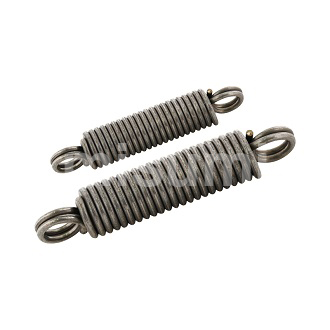
- Volume Discount
- Tension Springs Heavy Load, Double Round Hook, C-WAWT / C-WAWT series from MISUMI.
- This is an economy item; The price is cheaper than the MISUMI standard product.
- The wire material of spring is made of SWP-A.
- C-WAWT and C-WAWT are Heavy Load Double Hook Tension springs type.
- The outer diameter of spring can be selected from 5.0 mm to 14.0 mm.
- The free length of spring can be selected from 15 mm to 65 mm.
Part Number
Configured Part Number is shown.
Economy Tension Springs Double Round Hook
- These tension springs offer a broad range of allowable loads.
- The springs come with a range of outer diameters and free lengths within specified ranges.
- Available in multiple material options.
- Spring with adjustable tension and constant range
- The double round hook design enhances the spring's attachment security and load distribution, reducing the risk of failure under stress.


![]()
MISUMI Standard
![]()
Cheaper Price
![]()
Product Variety
![]()
3D CAD Support
Tension Springs Product Overview
◇ Made of quality materials, the Economy series tensile springs have been localized, greatly reducing the cost, and their cost efficiency is higher thanks to Misumi’s higher quality control performance.
◇ Tension Springs, Stainless steel materials are imported from Japan, and anti-rust resistance is high. Stainless steel springs are also magnetic. Please be careful.
◇ Misumi's Economy series tensile springs have been standardized in specifications, that is, the maximum load of the same diameter is a certain value. Initial tension, and the spring coefficient is a reference value.
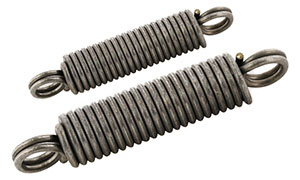 New Tension Springs Product Heavy Load· Double Hook |
Tension Springs Dimensional Drawing

・L = Free length
・D ≤ Ø18mm (±1.0)
・D ≥ Ø18mm (±1.5)
Tension Springs Product Feature
When not bearing load, the coils of tension spring are generally tight without clearance.
The working principle of Tension Springs is to act in reverse when stretching or pulling away, and to work by using the resilience (pulling force) after stretching, so as to control the movement of machine parts, absorb and store energy, measure the force and so on.
Tension Springs Specifications Overview
Calculation method of laps (reference value):
Total number of laps = (L-2(D-d))/d
Effective laps=total number of laps-2
The number of laps is a reference value, and varies slightly depending on batches.
Tension Springs Precautions
▶ Tension Springs Operating temperature
SWP-A…… Normal temperature (0 to 40℃)
Stainless steel…… -10 to 100℃
※ If the spring is used under conditions exceeding the above temperature, the load value may decrease due to usage conditions.
※ When used in an environment with high and low temperature differences and humidity such as outdoors, it is recommended to choose stainless steel products.
▶ Tension Springs Approximate number of times of use: about 1 million times
※ The above times are for reference only. The number of times of use varies with the tensile direction, operating temperature/environment, and amount of deformation. To increase the usage count, it is recommended to use the spring up to 70% of the allowable displacement Fmax..
▶Others
· Use within the allowable displacement Fmax.(mm). If it is used under the condition of exceeding the allowable displacement, the spring may be deformed, or damaged after using only a limited number of times. Please also be careful not to stretch the tensile spring beyond the allowable displacement when installing it.
· Stainless steel springs are also magnetic. Please be careful.
Tension Springs Example of Use
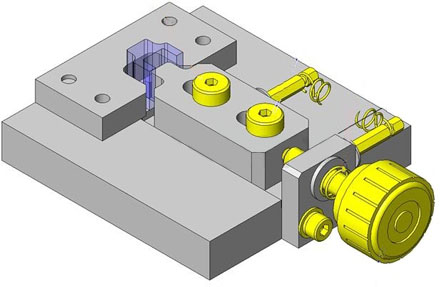
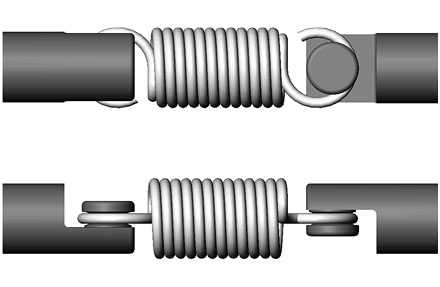
The installation diagram of single hook product is for reference only.
Tension Springs Related Products
| (Economy series) Tension Springs, Tensile Spring, Medium and Light Load, Medium Load, Medium and Heavy Load | (Economy series) Tension Springs, Tensile Spring, Ultra Light Load, Light Load | (Economy series) Tension Springs, Tensile Spring, Heavy Load |
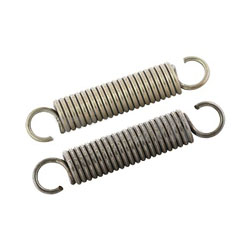 | 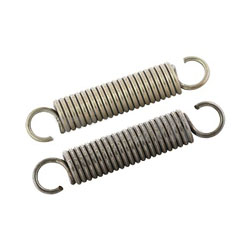 | 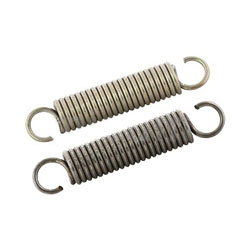 |
Tension Springs Specification Table
| Part Number | Wire Diameter dmm | Under dynamic load | (Initial tension) N | (Spring constant) N/mm | ||
 Tension Springs Type Tension Springs Type |  D- D- L L | Maximum displacement Fmax. Mm | Maximum load N | |||
| C-WAWT | 5-15 | 0.8 | 2.9 | 20.79 | 5.1 | 5.39 |
| 20 | 0.8 | 4.6 | 20.79 | 5.1 | 3.43 | |
| 25 | 0.8 | 6.4 | 20.79 | 5.1 | 2.45 | |
| 30 | 0.8 | 8.4 | 20.79 | 5.1 | 1.86 | |
| 35 | 0.8 | 10.0 | 20.79 | 5.1 | 1.57 | |
| 40 | 0.8 | 11.4 | 20.79 | 5.1 | 1.38 | |
| 45 | 0.8 | 13.3 | 20.79 | 5.1 | 1.18 | |
| 50 | 0.8 | 15.2 | 20.79 | 5.1 | 1.03 | |
| 6-20 | 1.0 | 3.7 | 33.15 | 8.6 | 6.57 | |
| 25 | 1.0 | 5.3 | 33.15 | 8.6 | 4.61 | |
| 30 | 1.0 | 6.9 | 33.15 | 8.6 | 3.53 | |
| 35 | 1.0 | 8.3 | 33.15 | 8.6 | 2.94 | |
| 40 | 1.0 | 10.0 | 33.15 | 8.6 | 2.45 | |
| 45 | 1.0 | 10.8 | 33.15 | 8.6 | 2.27 | |
| 50 | 1.0 | 12.5 | 33.15 | 8.6 | 1.96 | |
| 60 | 1.0 | 15.6 | 33.15 | 8.6 | 1.57 | |
| 8-25 | 1.2 | 5.3 | 41.19 | 9.81 | 5.88 | |
| 30 | 1.2 | 7.3 | 41.19 | 9.81 | 4.31 | |
| 35 | 1.2 | 9.1 | 41.19 | 9.81 | 3.43 | |
| 40 | 1.2 | 11.9 | 41.19 | 9.81 | 2.65 | |
| 45 | 1.2 | 13.6 | 41.19 | 9.81 | 2.35 | |
| 50 | 1.2 | 15.5 | 41.19 | 9.81 | 2.06 | |
| 60 | 1.2 | 18.8 | 41.19 | 9.81 | 1.67 | |
| Part Number | Wire Diameter dmm | Under dynamic load | (Initial tension) N | (Spring constant) N/mm | ||
 Tension Springs Type Tension Springs Type |  D- D- L L | Maximum displacement Fmax. Mm | Maximum load N | |||
| C-WAWT | 10-30 | 1.6 | 5.2 | 77.47 | 20.59 | 10.89 |
| 35 | 1.6 | 6.8 | 77.47 | 20.59 | 8.34 | |
| 40 | 1.6 | 8.4 | 77.47 | 20.59 | 6.77 | |
| 45 | 1.6 | 10.0 | 77.47 | 20.59 | 5.69 | |
| 50 | 1.6 | 11.6 | 77.47 | 20.59 | 4.9 | |
| 60 | 1.6 | 15.2 | 77.47 | 20.59 | 3.73 | |
| 65 | 1.6 | 17.0 | 77.47 | 20.59 | 3.35 | |
| 12-40 | 2.0 | 6.6 | 120.62 | 34.3 | 13.04 | |
| 45 | 2.0 | 7.7 | 120.62 | 34.3 | 11.18 | |
| 50 | 2.0 | 9.4 | 120.62 | 34.3 | 9.22 | |
| 60 | 2.0 | 12.1 | 120.62 | 34.3 | 7.16 | |
| 65 | 2.0 | 13.1 | 120.62 | 34.3 | 6.57 | |
| 14-40 | 2.3 | 5.8 | 154.95 | 45.11 | 19.02 | |
| 45 | 2.3 | 7.0 | 154.95 | 45.11 | 15.59 | |
| 50 | 2.3 | 8.4 | 154.95 | 45.11 | 13.14 | |
| 60 | 2.3 | 10.9 | 154.95 | 45.11 | 10.1 | |
Part Number
CAD Data download and 3D preview are not available because the part number has not yet been determined.
- *In order to open the CAD Data download and 3D preview screen, the part number must be fixed.
- Please confirm the part number from "Specification / Dimension"on the left side, and then perform the CAD Data Download / 3D Preview operation.
| Part Number |
|---|
| C-WAWT12-40 |
| C-WAWT12-45 |
| C-WAWT12-50 |
| C-WAWT12-60 |
| C-WAWT12-65 |
| C-WAWT14-40 |
| C-WAWT14-45 |
| C-WAWT14-50 |
| C-WAWT14-60 |
| Part Number | Standard Unit Price | Minimum order quantity | Volume Discount | Days to Ship | RoHS | Allowable Load (Configurable Range) (N) | Max. Load (N) | Length of Spring Used L+F (mm) | Free Length L (mm) | Outer Dia. D (Ø) | Initial Tension (N) | Standard Spring Constant (N/mm) | Wire Dia. (Ø) | Max. Deflection (mm) |
|---|---|---|---|---|---|---|---|---|---|---|---|---|---|---|
SGD 0.44 | 100 Piece(s) | Available | 5 Day(s) | 10 | 110.01~ | 120.62 | 46.6 | 40 | 12 | 34.3 | 13.04 | 2 | 6.6 | |
SGD 0.48 | 100 Piece(s) | Available | 5 Day(s) | 10 | 110.01~ | 120.62 | 52.7 | 45 | 12 | 34.3 | 11.18 | 2 | 7.7 | |
SGD 0.50 | 100 Piece(s) | Available | 5 Day(s) | 10 | 110.01~ | 120.62 | 59.4 | 50 | 12 | 34.3 | 9.22 | 2 | 9.4 | |
SGD 0.56 | 1 Piece(s) | Available | Same day | 10 | 110.01~ | 120.62 | 72.1 | 60 | 12 | 34.3 | 7.16 | 2 | 12.1 | |
SGD 0.58 | 50 Piece(s) | Available | 5 Day(s) | 10 | 110.01~ | 120.62 | 78.1 | 65 | 12 | 34.3 | 6.57 | 2 | 13.1 | |
SGD 0.60 | 50 Piece(s) | Available | 5 Day(s) | 10 | 110.01~ | 154.95 | 45.8 | 40 | 14 | 45.11 | 19.02 | 2.3 | 5.8 | |
SGD 0.64 | 50 Piece(s) | Available | 5 Day(s) | 10 | 110.01~ | 154.95 | 52 | 45 | 14 | 45.11 | 15.59 | 2.3 | 7 | |
SGD 0.66 | 50 Piece(s) | Available | 5 Day(s) | 10 | 110.01~ | 154.95 | 58.4 | 50 | 14 | 45.11 | 13.14 | 2.3 | 8.4 | |
SGD 0.72 | 1 Piece(s) | Available | Same day | 10 | 110.01~ | 154.95 | 70.9 | 60 | 14 | 45.11 | 10.1 | 2.3 | 10.9 |
Loading...
Basic Information
| Material | SWP-A | Type | Standard Type | Hook Opposing Angle | 180° (2 Layers) |
|---|
Specification/Dimensions
-
Max. Load(N)
-
Length of Spring Used L+F(mm)
-
Free Length L(mm)
-
Outer Dia. D(Ø)
-
Initial Tension(N)
-
Standard Spring Constant(N/mm)
-
Wire Dia.(Ø)
-
Max. Deflection(mm)
-
type
- C-WAWT
-
Allowable Load (Configurable Range)(N)
- 15.01~30.00
- 30.01~60.00
- 60.01~110.00
- 110.01~
-
CAD
- 2D
- 3D
Days to Ship
-
- All
- Same day
- 5 Day(s) or Less
Specify Alterations
- The specifications and dimensions of some parts may not be fully covered. For exact details, refer to manufacturer catalogs .
Frequently asked question (FAQ)
- Question: What is the initial tension?
-
Answer:
It can be understood that when a general tensile spring is under tension, the tension measured when it is about to undergo elastic deformation without deformation (critical state) is called the initial tension. It is realized by properly controlling the process parameters in the manufacturing process of tensile spring.
MISUMI tension spring specifications (except for free designation) have been standardized, i.e. the maximum load of the same diameter is a certain value. Because the tensile spring is made on the basis of the maximum load, the initial tension and spring coefficient are the reference values. - Question: What is the life of the tensile spring?
-
Answer:
Some hook installation methods of tension springs may cause stress concentration, so the standard use times cannot be provided. To increase the use times, it is recommended to use it under 70% of the allowable displacement Fmax.
·It is recommended to use it at room temperature below 40℃ and the load value will decrease due to service conditions at temperature over 40℃. - Question: What is the spring constant?
- Answer: The spring constant is the force necessary to give the spring unit displacement, which is used to express the characteristics of the spring.
- Question: What are the JIS standards for general spring-related materials?
-
Answer:
Piano wires: JIS G 3522
Iron wires: JIS G 3532
Hard drawn steel wires: JIS G 3521
Stainless steel wires for springs: JIS G 4313 - Question: What is the difference between a piano steel wire spring and a hard drawn steel wire spring?
-
Answer:
There is little difference in appearance between the two materials. In short, the piano wire is an advanced material, and the hard drawn steel wire is a general material.
The piano wire is often used as a spring for precision machinery while the hard drawn steel wire is mostly used as a peripheral spring for groceries or blinds.
They are both high-carbon steels with almost the same chemical composition. The production of piano wires is time-consuming and they are expensive because there is additional standardized management and inspection of impurities, the depth of surface scars, and the depth of decarburized layer.
Although the subtle difference is invisible to the naked eye, it has a great influence on the quality of the spring.



How can we improve?
How can we improve?